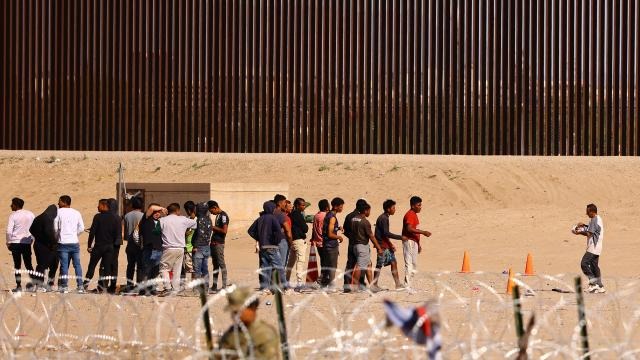President Joe Biden’s administration said on Thursday it will add sections to a border wall to stave off record migrant crossings from Mexico, carrying forward a signature policy of former President Donald Trump.
Trump is the frontrunner for the Republican Party nomination to challenge Biden, a Democrat, in the 2024 presidential race. Trump made building border barriers a central tenet of his first campaign for president with the rally chant, “Build That Wall.”
One of Biden’s first actions after taking office in January 2021 was to issue a proclamation pledging that “no more American taxpayer dollars be diverted to construct a border wall” as well as a review of all resources that had already been committed.
The administration said Thursday’s action did not deviate from Biden’s proclamation because money that was allocated during Trump’s term in 2019 had to be spent now.
Homeland Security Secretary Alejandro Mayorkas said in a statement that there was “no new Administration policy with respect to border walls. From day one, this Administration has made clear that a border wall is not the answer.”
Mayorkas said the construction project was appropriated during the prior administration and the law requires the government to use the funds, with an announcement made earlier in the year. “We have repeatedly asked Congress to rescind this money but it has not done so and we are compelled to follow the law,” he said.
Trump, however, was quick to claim victory and demand an apology.
“As I have stated often, over thousands of years, there are only two things that have consistently worked, wheels, and walls!” Trump wrote on social media. “Will Joe Biden apologize to me and America for taking so long to get moving…”
Mexico’s President Andres Manuel Lopez Obrador called the move “a step backwards.”
IMMIGRATION A POLITICAL ISSUE
Immigration will likely be a campaign theme in the U.S. presidential race with a majority of Americans – 54% – agreeing with the statement that “immigration is making life harder for native-born Americans,” a September Reuters/Ipsos poll found.
Some 73% of Republicans and 37% of Democrats surveyed agreed with that statement.
The Biden administration decision to move forward with the border barriers will open the president to criticism from his left-leaning base, including immigration advocates and environmentalists opposed to more construction.
In a notice published in the Federal Register on Thursday, Biden’s Department of Homeland Security said it needed to waive a number of laws, regulations and other legal requirements to construct barriers in Starr County, Texas.
The county is in Rio Grande Valley Sector where Border Patrol agents have encountered more than 245,000 people entering the United States this fiscal year, Homeland Security Secretary Alejandro Mayorkas said in the Federal Register post.
“There is presently an acute and immediate need to construct physical barriers and roads in the vicinity of the border of the United States in order to prevent unlawful entries,” he said.
Environmentalists voiced their displeasure.
“Starr County is home to some of the most spectacular and biologically important habitat left in Texas,” said Laiken Jordahl, Southwest conservation advocate at the Center for Biological Diversity, which has opposed the wall, in a statement, “and now bulldozers are preparing to rip right through it.”
The White House in a statement said it has taken a different approach to try to fix the “broken immigration system” they said Biden “inherited,” including increasing legal pathways for migrants and investing in border security technology.
STRUGGLE WITH RECORD MIGRANT CROSSINGS
The administration has been struggling operationally and politically with a record number of migrant crossings at the U.S.-Mexico border during Biden’s term with new highs hit in September.
Biden initially promised to roll back many of Trump’s immigration policies, but kept in place a COVID-era public health order known as Title 42, which allowed border agents to expel migrants to Mexico without a chance to seek asylum.
When Title 42 expired on May 11 this year, the Biden administration replaced it with a tough new rule that requires migrants to make an appointment on a government-run smartphone app before approaching a legal port of entry or face a tougher bar for asylum if they cross the border illegally.
Migrant numbers initially plummeted after the announcement of the new rule, but in recent weeks they began rising again, driven in part by thousands of migrants fleeing Venezuela.
In another major enforcement action announced on Thursday, Biden administration officials said they would be resuming deportation flights to Venezuela, which had been suspended because of chilly relations between the two countries.
Hundreds of thousands of Venezuelans, many fleeing economic and political turmoil at home, have trekked through the treacherous jungle region between Colombia and Panama known as the Darien Gap to reach the U.S.-Mexico border in the past two years.
The increase of migrants has strained U.S. cities at the border and farther north. Asylum seekers can be released into the country to make their claims in immigration court where more than 2 million cases are pending, according to the U.S. Department of Justice, and often take years to resolve.
Republican governors near the border, who say Biden is not doing enough to stop the crossings, have bused some arriving migrants to Democratically controlled cities such as New York and Chicago, with some Democratic leaders there now also criticizing Biden.
New York City Mayor Eric Adams on Thursday began a trip to Mexico, Colombia and Ecuador to tell would-be migrants that his city cannot accommodate them after local shelter systems have been overwhelmed.
Around 11 million immigrants are in the U.S. without legal documentation, says the Washington-based Migration Policy Institute. Many have lived and worked in the country for years or decades.
Biden tried early in his tenure to get a comprehensive immigration reform bill passed in Congress, but Republican opposition thwarted progress.









